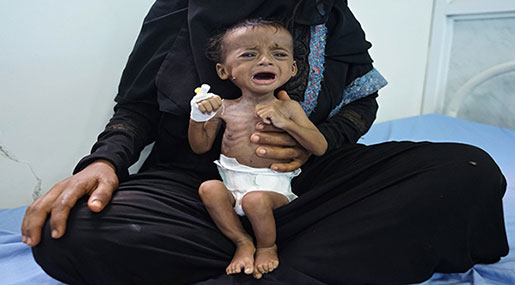
Nations Could Stop Yemen’s Deadly Crisis, But Won’t

National Catholic Report's Editorial
At an international gathering in April meant to raise humanitarian aid for Yemen, UN Secretary-General António Guterres declared: "Yemen is the world's worst humanitarian crisis." That's quite a statement given the competition for that title: Rohingya refugees straddling the border of Myanmar and Bangladesh; Syria's ceaseless, senseless war; and South Sudanese flooding into East African neighbors and looking toward Europe.

Guterres made a pretty good case.
Eighty percent of Yemen's 29 million citizens rely on humanitarian assistance to survive. Eighteen million people have no reliable access to food. Eight and a half million people have no idea where their next meal will come from. One and a half million people are living on the brink of famine. Sixteen million people have no access to basic water or sanitation. The same number lack access to basic health care. In April, the country had nearly 1 million cases of cholera. Measles and malnutrition are devastating a generation of children.
The April gathering secured more than $2 billion in aid for Yemen for 2018. Just under $1 billion came from the kingdom of Saudi Arabia and the United Arab Emirates. The United States and Britain pledged $237 million and $87 million, respectively.
How's this for a dilemma: The largest donors to the international humanitarian relief effort in Yemen are also the largest contributors of the armed conflict that has reduced this nation on the Arabian Peninsula to smoldering ruins.
Since 2015, Yemen has been ground zero in a scorched-earth war. According to the UN Office for the Coordination of Humanitarian Affairs, at least 9,000 people have died in the last three years, though other estimates place the toll much higher. More than 6,100 causalities are civilians, and a quarter are children, the UN says.
Airstrikes, which include the use of cluster bombs, by the Saudi and UAE coalition caused 61 percent of the recorded civilian casualties.
The relief organization Médecins Sans Frontières issued a report May 18 that said, "In the past three years, the coalition has carried out 16,749 air raids in Yemen, i.e., an average of 15 a day. Almost a third of the raids have hit non-military sites." US armed forces, meanwhile, assist the Saudi-UAE coalition with aerial targeting, intelligence sharing and mid-flight aerial refueling.
At the end of 2017 the Saudi and UAE coalition blocked all Yemeni land, air and sea ports. Some restrictions have been eased, but the coalition has continued to impede aid and commercial imports and has kept Yemen's main airport closed since August 2016.
The latest report on Yemen by the US Agency for International Development said that at the end of April, the coalition was blocking entry of 11 vessels carrying 117,000 metric tons of food. A UN panel of experts called the ongoing blockade of humanitarian and commercial goods "essentially using the threat of starvation as a bargaining tool and an instrument of war."
The UN special envoy to Yemen, the veteran British diplomat Martin Griffiths, has pledged to present the UN Security Council with a framework for peace by the end of June. He said "a political solution to end this war is indeed available" but also warned that military escalation could "in a single stroke take peace off the table."
International players have shown little interest in peace for Yemen. In recent months, Germany, Belgium and Norway stopped arms sales to warring parties in Yemen, but France and Britain have renewed pledges of support to the Saudi and UAE coalition. In March, the US State Department announced a $1 billion military deal with Saudi Arabia that includes parts and maintenance support for Saudi tanks and helicopters and the sale of 6,700 anti-tank missiles.
The humanitarian crisis in Yemen is totally man-made. It could be contained and a peace process put in motion. The problem is that the nations that could stop the crisis won't.
Source: NCR, Edited by website team
Comments



